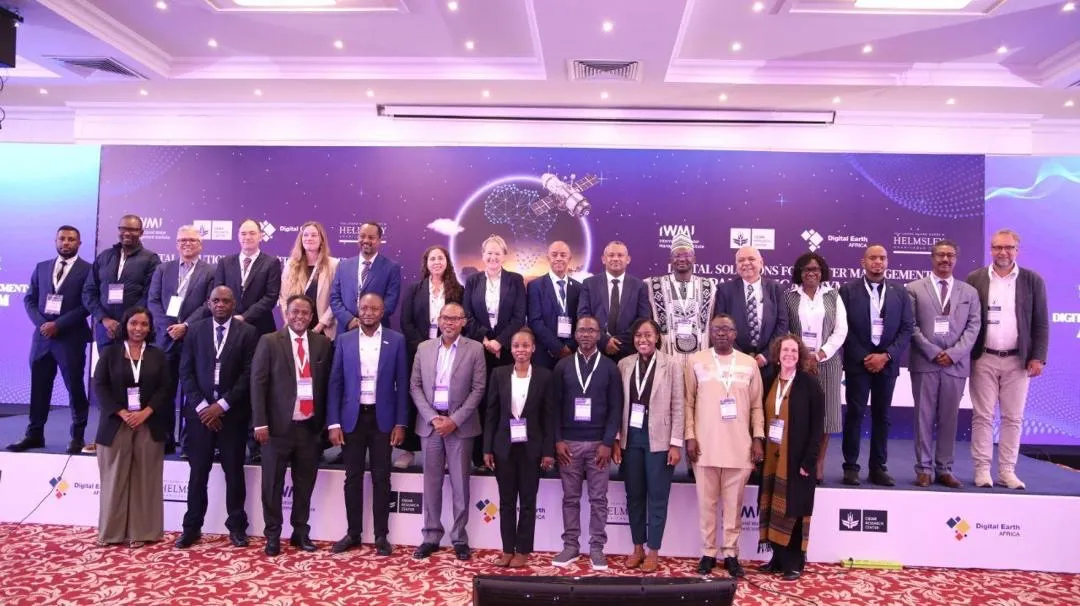The Pan-African Symposium on Digital Solutions for Water Management brought together over 200 experts, policymakers, and innovators from across Africa and beyond to discuss how digital tools and partnerships can support a water-secure future for the continent.
Held in Addis Ababa, Ethiopia, from 21–23 October 2025, the symposium was co-organized by the International Water Management Institute (IWMI) and Digital Earth Africa (DE Africa), in collaboration with the Ethiopian Space Science and Geospatial Institute (SSGI) and the Ministry of Water and Energy (MoWE) of Ethiopia.
The event was officially opened by His Excellency Mr. Abdissa Lema, Director General of SSGI, and featured welcome remarks from Dr. Rachael McDonnell, Deputy Director General at IWMI, and HE Dr.-Ing Habtamu Itefa, Minister of Water and Energy of Ethiopia.
Setting the scene: Challenges and opportunities
Day one focused on Africa’s digital transformation in the water sector. A high-level panel discussed the opportunities and challenges of Digital Innovation and Africa’s Water Future, moderated by Dr. Rachael McDonnell. The panel featured speakers from the World Bank, Digital Earth Africa, ESRI, Volta Basin Authority, and Ethiopia’s Ministry of Water and Energy, who shared insights on how data and technology can address growing water challenges.
The day also featured showcases on digital tools for water resources management, including multi-scale water accounting assessments, continental river discharge models, and the launch of the IWMI GeoPortal. The evening concluded with an innovation exhibition and networking reception.
From data to action: Tools, insights, and adoption
Day two emphasised practical demonstrations of data-driven solutions. Digital Earth Africa’s Dr. Kenneth Mubea led a live session on DE Africa products and tools, showing how satellite data can be used to monitor floods, droughts, and water resources across Africa.
The session also saw the launch of the Digital Twin of the Limpopo River Basin, an initiative designed to help policymakers and planners visualize real-time water data and scenarios.
Also on day 2, DIWASA (Digital Innovations for Water Secure Africa) partners showcased use cases from Ghana, Ethiopia, Zambia, and Burkina Faso, highlighting how Earth observation and digital innovations are being integrated into national water management systems.
The day closed with a creative poster competition, where students and researchers presented innovative ideas for water monitoring. The overall winner, Mr. Wegayehu Asfaw from Arba Minch University, presented a project on monitoring Lake Tana’s water levels using DE Africa data and satellite altimetry.
Building the future: Policy, partnerships, and practice
The final day brought focus to policy and collaboration. A panel discussion on Creating the Enabling Environment for Digital Water Management in Africa featured representatives from IWMI, Digital Earth Africa, Ghana Irrigation Development Authority, Global Water Partnership Southern Africa (GWPSA), and other key institutions.
The dialogue underscored that digital transformation is not only a technological evolution but also a societal shift toward transparency, inclusion, and resilience.
In closing, participants reaffirmed their shared commitment to building a digitally enabled, water-secure Africa. They called for stronger partnerships, greater data sharing, and continued capacity building to make data-driven, climate-resilient water management a cornerstone of Africa’s development agenda.
Learn more and get involved:
- الموقع الإلكتروني: www.digitalearthafrica.org
- البريد الإلكتروني: info@digitalearthafrica.org
- Explore free learning courses: learn.digitalearthafrica.org
- Follow Digital Earth Africa for updates on لينكد إن و X (Twitter)
 اللغة الإنجليزية
اللغة الإنجليزية  البرتغالية
البرتغالية  الفرنسية
الفرنسية  العربية
العربية 